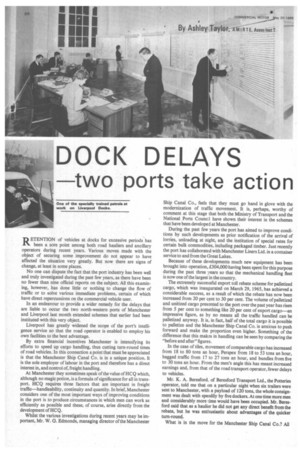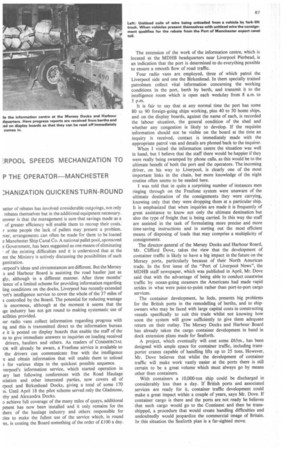DOCK DELAYS
Page 68

Page 69

If you've noticed an error in this article please click here to report it so we can fix it.
two ports take action
:RPOOL SPEEDS MECHANIZATION TO P THE OPERATOR-MANCHESTER HANIZATION QUICKENS TURN-ROUND
RETENTION of vehicles at docks for excessive periods has been a sore point among both road hauliers and ancillary operators during recent years. Various moves made with the object of securing some improvement do not appear to have affected the situation very greatly. But now there are signs of change, at least in some places.
No one can dispute the fact that the port industry has been well and truly investigated during the past few years, as there have been no fewer than nine official reports on the subject. All this examining, however, has done little or nothing to change the flow of traffic or to solve various immediate problems, certain of which have direct repercussions on the commercial vehicle user.
In an endeavour to provide a wider remedy for the delays that are liable to occur the two north-western ports of Manchester and Liverpool last month extended schemes that earlier had been instituted with this very object.
Liverpool has greatly widened the scope of the port's intelligence service so that the road operator is enabled to employ his own facilities to the best advantage.
By extra financial incentives Manchester is intensifying its efforts to speed up cargo handling, thus cutting turn-round times of road vehicles. In this connection a point that must be appreciated is that the Manchester Ship Canal Co. is in a unique position. It is the sole employer of labour in the port and therefore has a direct interest in, and control of, freight handling.
At Manchester they sometimes speak of the value of HCQ which, although no magic potion, is a formula of significance for all in transport. HCQ requires three factors that are important in freight traffic—handleability, continuity and quantity. In brief, Manchester considers one of the most important ways of improving conditions in the port is to produce circumstances in which men can work as efficiently as possible and these, of course, arise directly from the development of HC Q.
Whilst the various investigations during recent years may be important, Mr. W. G. Edmonds, managing director of the Manchester Ship Canal Co., feels that they must go hand in glove with the modernization of traffic movement. It is, perhaps, worthy of comment at this stage that both the Ministry of Transport and the National Ports Counc I have shown their interest in the schemes that have been developed at Manchester.
During the past few years the port has aimed to improve conditions by such developments as prior notification of the arrival of lorries, unloading at night, and the institution of special rates for certain bulk commodities, including packaged timber. Just recently the port has collaborated with Manchester Liners Ltd. in a container service to and from the Great Lakes.
Because of these developments much new equipment has been brought into operation, £304,000 having been spent for this purpose during the past three years so that the mechanical handling fleet is now one of the largest in the country.
The extremely succeisful export toll rebate scheme for palletized cargo, which was inaugurated on March 29, 1965, has achieved a considerable success, as a result of which the rebate has now been increased from 20 per cent to 30 per cent. The volume of palletized and unitized cargo presented to the port over the past year has risen from 5 per cent to something like 20 per cent of export cargo—an impressive figure, as by no means all the traffic handled can be palletized anyway. It is, in fact, half of the total cargo it is possible to palletize and the Manchester Ship Canal Co. is anxious to push forward and make the proportion even higher. Something of the difference that this makes in handling can be seen by comparing the "before and after" figures.
In the case of tiles, movement of comparable cargo has increased from 18 to 80 tons an hour, Perspex from 18 to 53 tons an hour, bagged traffic from 17 to 27 tons an hour, and bundles from five to 30 tons an hour. From the men's angle this has meant increased earnings and, from that of the road transport operator, fewer delays to vehicles.
Mr. K. A. Beresford of Beresford Transport Ltd., the Potteries operator, told me that on a particular night when six trailers were sent to Manchester, with a payload of 120 tons, the whole consignment was dealt with speedily by five dockers. At one time more men and considerably more Lime would have been occupied. Mr. Beresford said that as a haulier he did not get any direct benefit from the rebate, but he was enthusiastic about advantages of the quicker turn-round.
What is in the move for the Manchester Ship Canal Co.? All latter of rebates has involved considerable outgoings, not only rebates themselves but in the additional equipment necessary. inswer is that the management is sure that savings made as a of greater efficiency will enable them to recoup their costs.
r some people the lack of pallets may present a problem. :vet% arrangements can often be made for them to be loaned e Manchester Ship Canal Co. A national pallet pool, sponsored e Government, has been suggested as one means of eliminating • of the existing difficulties and it is understood that at the ent the Ministry is actively discussing the possibilities of such ganization, terpool's ideas and circumstances are different. But the Mersey .s and Harbour Board is assisting the road haulier just as gly, although in a different manner. After three months' ience of a limited scheme for providing information regarding ling conditions on the docks, Liverpool has recently extended 'ort's intelligence service to cover the whole of the 37 miles of s controlled by the Board. The potential for reducing wastage is enormous, although at the moment it seems that the ige industry has not got round to making systematic use of acilities provided.
ur radio vans collect information regarding progress with ng and this is transmitted direct to the information bureau e it is posted on display boards that enable the staff of the iu to give immediate answers to inquiries on loading received drivers, hauliers and others. As readers of COMMERCIAL OR will already be aware, a Freefone service is available so the drivers can communicate free with the intelligence
✓ and obtain information that will enable them to unload 3 for various ships in the quickest possible sequence. verpool's information service, which started operation in ary last following conferences with the Road Haulage
■ ciation and other interested parties, now covers all of rpool and Birkenhead Docks, giving a total of some 170 is. Until April 18 the pilot scheme served only the Gladstone, riby and Alexandra Docks.
o achieve full coverage of the many miles of quays, additional pment has now been installed and it only remains for the 'hers of the haulage industry and others responsible for ties to make the fullest use of the service which, in round vs, is costing the Board something of the order of 100 a day.
The extension of the work of the information centre, which is located at the MDHB headquarters near Liverpool Pierhead, is an indication that the port is determined to do everything possible to ensure a smooth flow of road traffic.
Four radio vans are employed, three of which patrol the Liverpool side and one the Birkenhead. In them specially trained patrolmen collect vital information concerning the working conditions in the port, berth by berth, and transmit it to the intelligence room which is open each weekday from 8 a.m. to 5 p.m.
It is fair to say that at any normal time the port has some 80 to 90 foreign-going ships working, plus 40 to 50 home ships, and on the display boards, against the name of each, is recorded the labour situation, the general condition of the shed and whether any congestion is likely to develop. If the requisite information should not be visible on the board at the time an inquiry is received, contact is immediately made with the appropriate patrol van and details are phoned back to the inquirer.
When I visited the information centre the situation was well in hand, but I believe that the staff there would be happier if they were really being swamped by phone calls, as this would be to the ultimate benefit of both the port and the operators. The incoming driver, on his way to Liverpool, is clearly one of the most important links in the chain, but more knowledge of the night routine often seems to be needed here.
I was told that in quite a surprising number of instances men ringing through on the Freefone system were unaware of the ultimate destination of the consignments they were carrying, knowing only that they were dropping them at a particular ship. It is emphasized that when inquiries are made it is frequently of great assistance to know not only the ultimate destination but also the type of freight that is being carried. In this way the staff are assisted in the task of formulating more precise and more time-saving instructions and in sorting out the most efficient means of disposing of loads that may comprise a multiplicity of consignments.
The director-general of the Mersey Docks and Harbour Board, Mr. Clifford Dove, takes the view that the development of container traffic is likely to have a big impact in the future on the Mersey ports, particularly because of their North American trade. In the first issue of the "Port of Liverpool News", the MDHB staff newspaper, which was published in April, Mr. Dove said that with the advantage of being able to conduct coastwise traffic by ocean-going steamers the Americans had made rapid strides in what were point-to-point rather than port-to-port cargo services.
, The container development, he feels, presents big problems for the British ports in the remodelling of berths, and to shipowners who may be faced with large capital costs in constructing vessels specifically to suit this trade whilst not knowing how soon the system will grow sufficiently to give them adequate return on their outlay. The Mersey Docks and Harbour Board has already taken the cargo container development in hand in dock extension plans made for Seaforth.
A project, which eventually will cost some L65m., has been designed with ample space for container traffic, including transporter cranes capable of handling lifts up to 25 tons. However, Mr. Dove believes that whilst the development of container traffic will make work vastly easier at the ports there is still certain to be a great volume which must always go by means other than containers.
With containers a 10,000-ton ship could be discharged in considerably less than a day. If British ports and associated services are ready for it, container traffic development could make a great impact within a couple of years, says Mr. Dove. If container cargo is there and the ports are not ready he believes that such cargo would go to the Continent and then be transshipped, a procedure that would create handling difficulties and undoubtedly would jeopardize the commercial image of Britain. In this situation the Seaforth plan is a far-sighted move.




























































































































